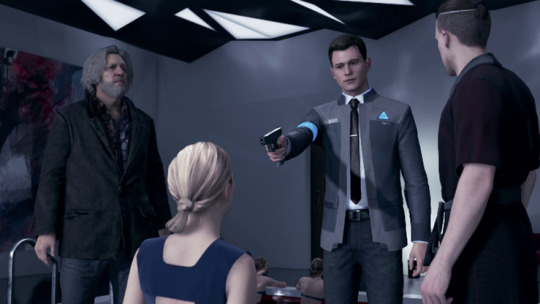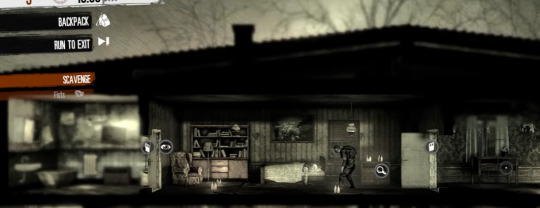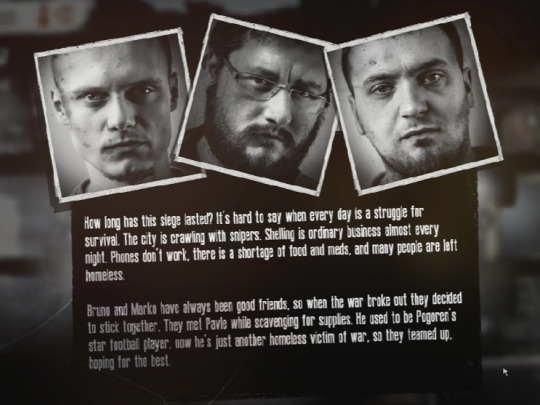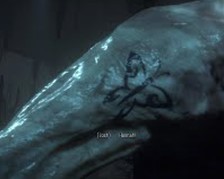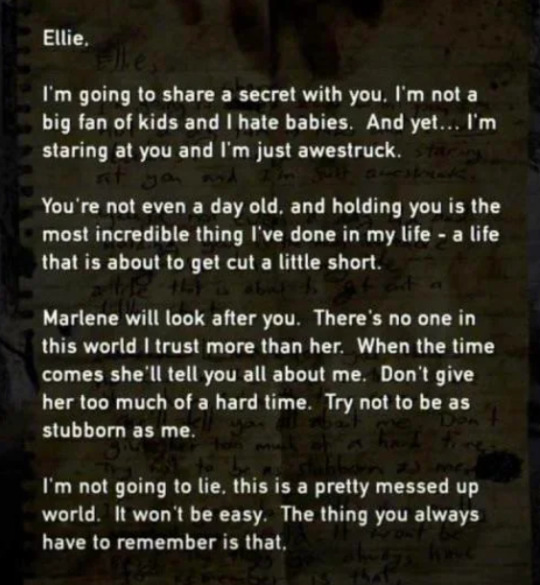Don't wanna be here? Send us removal request.
Text
Research and References
Research and References:
https://global.oup.com/academic/product/we-the-gamers-9780190926113?cc=us&lang=en&
https://www.washingtonpost.com/health/2022/06/25/video-games-empathy/
Let's talk about the dogs in 'The Last of Us Part II' | Mashable
CHAPTER 12 Simulated Killing from Ethics for A-Level on JSTOR
0 notes
Text
Conclusion
Many video games incorporate empathy to build upon emotions, but some even use it as a tool to teach players as they go, an overarching example of this is the 'Telltale' gaming company's use of their graphic ‘…will remember this’ to pass judgment on the player for their actions, this creates an emotional consequence that sits with you, a reminder that an inconsequential action or comment for one person could be life-changing for another just as it is for real life. In conclusion, I believe video games are a useful tool to teach empathy and the games I have analysed show that the medium utilises emotion well to improve gameplay, in a way that is unique from other forms of media. It is the ability to put ourselves into a character's shoes and make decisions as that person, that creates the most emotionally impactful moments. The way NPCs are also portrayed in the gameplay is one of the most vital parts of this idea, I believe, that creating them as multi-faceted characters, even in simple ways such as the voice lines in ‘The Last of Us Part 2’ can help curb the desensitisation that is rampantly associated with violent video games while still being fun and darkly entertaining.
0 notes
Text
Detroit Become Human, (2018)
‘Detroit Become Human’ is a story taking place in a futuristic Detroit, USA where super-advanced technology has culminated in the creation of ‘androids’, full machines programmed and designed to look and act as if they were human, created by a group called ‘Cyberlife’, the plot develops around certain androids that have become ‘deviant’ due to developing an archaic form of free will, to the point that they realise they wish to be free of the duties that they were assigned at creation, this ties with the current climate of fear towards the increasing development of AI in everyday living, it begs the question how far will we go in the pursuit of knowledge and how much are we willing to risk. ‘Humanities greatest achievement threatens to be its downfall, isn’t it ironic?’- Elijah Kamski.
The development of ‘deviants’ asks the question does their ability to feel emotions for themselves not make them partially human too? Detroit Become Human's view on the idea of empathy is explored via the androids, and how they act with humans and each other, for instance, one of our tri-protagonists, Kara, breaks free from her mould as a home-serving machine in order to save a young girl from the abusive father that bought her. Playing the storyline of Kara works in a similar way as ‘This War of Mine’, being from the point of view of an innocent bystander caught in a desperate situation, making split-second decisions in order to save herself and the young girl she ran away with. Throughout the gameplay as Kara, there are many amoral decisions the player, in some cases, has to make and with so many different possible endings, your choices and reactions truly matter to determine the outcome and the endings of every character.
A minor plot point of this game is the creation of religion and the creation myth. A huge turning point for the androids, that we see with Markus’s storyline, is the deviant’s belief in something of a saviour, an ‘other’ which is rumoured to be the original android, that will help free them from their enslavement. Scrawling their scripture through many crime scenes investigated for suspected deviants, we explore the links between deviancies and this recurring idea of an entity dubbed RA9, with Connor, this idea is interesting, as religion is something seen as wholly human, humanity has been following religions from the dawn of time, some over a 4,000 years ago, it is something that, for a long time separated us from the rest of the animal kingdom, this belief in a higher power. This semi-religion also introduces a concept of empathy vs religious fear, are you a good person because you feel for your fellow man? Because you can put yourself in their shoes and understand them, or is it because you are all fearing of an eternal punishment inflicted by a deity that may or may not exist nor care? This is an intriguing question that everyone should ask themselves, for the purpose of this blog though I shall deviate (no pun intended) back to my evaluation. Finding out these similarities between androids and humans, and even growing fond of each other in Connor and Hanks's case, means that this futuristic society must begin to conceptualise the idea that the androids that they have brought into the world might actually have human feelings and may be deserving of respect, thus, making them want to reject to the idea of androids gaining free will as it forces them to empathise with a group that they have enslaved since their creation, it is not subtle either, the real-life connotations of this way of feeling towards the ‘other’. ‘Maybe you are alive’- Hank.
Detroit Become Human is split between 3 timelines, each following a different android, the most notable one of these is Connor and his partner Hanks's storyline as detectives investigating this sudden rise of deviant Androids, while their relationship is consistently shaky, the game gives the player options to boost Hanks opinion of androids one way or the other, Connor and Hank are initially the most opposed to the idea that deviants are legitimately experiencing human emotions “They don’t really feel emotions, they just get overwhelmed by irrational instructions- Connor” yet Connor consistently shows his own which, in turn, becomes a positive for his relationship with Hank. A notable showcase of this is the Kamski test, a test for empathy within machines, created by, Elijah Kamski, the founder of ‘Cyberlife’, in this ‘test,’ Connor is instructed to shoot an innocent android, giving the player the option to decide not to shoot, projecting their own human empathy onto the character, or to shoot and use the subdued ethics of simulated reality to explore the darker path, if the decision is not to shoot then Hank commends Connor for his show of sympathy and his opinion of Connor improves but if Connor shoots, the player receives vital information, however, the response from Hank is negative, ‘“You’re a low life, you don’t feel a thing. A Machine! That’s what you are! You’re just a fucking machine.” this voice line shows that even Hank starts to believe, tentatively, in the humanity of androids through to his relationship with Connor. Throughout the game, Hank is a gruff, android-hating man who slowly begins to empathise with a machine to the point he begins to project his own morality onto him and is shocked when Connor doesn’t reflect that within himself, Hank is mad that Connor doesn’t reflect his empathy ‘because that’s literally what empathy is: a projection of yourself onto others’- Matthew Farber, co-author of https://unesdoc.unesco.org/ark:/48223/pf0000261993.
To conclude this entry: Detroit Become Human invites the player to be empathetic towards the characters by allowing them to connect via the amount of personalisation within the gameplay, the player can determine for themselves if the androids can indeed feel empathy and compassion and also explores the idea of empathy within non-human entities.
1 note
·
View note
Text
This War of Mine (2014)
This War of Mine is a survival war game from the perspective of a surviving group of civilians during a horrific civil war and takes place in a war-torn fictional city, presumably somewhere in eastern Europe due to its setting. ‘This War of Mine’ is a simple yet powerful game coming from a rarely reported civilian account of an age-old story about the realities of war. The game mechanics of ‘This War of Mine’ puts the survival of a whole group of people (including, in the Little Ones DLC, children) in the hands of whichever character you are randomly assigned. Empathy in This War of Mine is conducted through its realism, it is a fictionalised portrayal of the lived experiences of thousands of people and contains the mundane tasks of wartime living for the average civilian, such as scavenging and base-building as you act as the default leader of a traumatised band of survivors.
There is a mechanic in the game called the ‘sympathy system’ in which a character's personality/’archetype’ affects how likely they are to make amoral decisions this creates a fully-rounded character with a distinct, realistic personality, each character is also introduced with a different skill set and background story to establish them as people capable and deserving of empathy, for instance, the character, Pavle, is introduced as a star football player whose dreams of playing have been dashed by the breakout of the civil war, which creates an emotional bond to that character, we can empathise with the idea that something you love so much, that you work so hard for all of your life can be forceful taken from you in circumstances beyond your control, civilians aren’t just mindless NPCs, they have hopes and dreams for the future.
There are many studies, such as https://www.washingtonpost.com/health/2022/06/25/video-games-empathy/ that investigate the concept of using video games to teach empathy by putting the player in the shoes of other people, fictional or not by using games to safely explore dangerous situations and grasp the experiences of different lives, in his video, https://youtu.be/p1Gy0fgyEsw?si=6GHjJjePnRWJyZko, YouTuber Yaboiii talks about how one scene in particular stuck with him when at a dire point in his gameplay he was forced to raid the house of an elderly NPC couple for their food and medicine only to return days later to find they had passed in their sleep, the idea of living such a long, life and surviving so much just to be forced away from each other due to the perceived whim of a stranger is such a hard one to conceptualise but we can still understand the tragedy of it.
A majority of video games that are about war consist of FPS and strategy gameplay which receive a lot of criticism for creating desensitisation in the killing of the ‘other’, no matter which side you are on, or how your political beliefs align, First-person shooters will portray whichever side you are on as the correct one per the politics within the game, the player kills whomever it takes to reach the end, and lots of the time justification isn’t even necessary, that is just the way of the game, This War of Mine however, pleads the fact that in war, neither side is correct, both sides may have their reasonings and those reasons may be valid, but as the game itself states, ‘ideology means ultimately nothing if you’re reduced to eating rats.’ in the world of war and politics it is always the average civilian who pays the price as their leaders play with their lives.
Videogames giving the player the ability to walk in the shoes of someone in a vastly different circumstance is why games like This War of Mine affect us so deeply, as human beings we can empathise with something that at its core is just lines of code on a screen simply because it's not that far removed from reality.
0 notes
Text
Until Dawn, (2015)
The entire premise of Until Dawn is how a covered incident returns to haunt a group of young adults as they return to the scene of their friend's recent deaths, in a cutscene and gameplay tutorial the game opens up 1 year before our current timeline and shows our cast and two sisters as they get away for the holidays, on the first night one of the sisters, Hannah, gets picked on enough by the others to cause her to run out into the freezing forest, her sister chases after her and the night ends tragically.
There are multiple major plot twists through Until Dawn but the most heartbreaking one is the reveal that the monsters the players have been fighting were once their friends, the sisters they had driven to their deaths which subsequently led to this whole thing starting, this idea of consequence leaves the player feeling in the wrong too, was there any way to help at the start of the game, if it weren’t for the game mechanics keeping you as a bystander in the tragedy? the game puts you in a position to think the same as the characters, it gives you the foresight to ask yourself, would this all be happening if I did something back then? How much pain could be spared if everyone had the foresight to be empathetic to Hannah’s insecurities?
Until Dawn may be a game with supernatural tropes but all the relationships feel real, we also get a chance to play as each character throughout the game so there are no NPCs are we understand them to be, and each character is fully fleshed out, the player is given the chance to come to like and root for each character and despite knowing the horrible deed they have committed we, as the player, still feel sad during the grim deaths of the characters especially since it is our actions that get them killed, despite the first two characters being at the whim of the code, there is a chance to save every character if the player makes the correct decisions.
0 notes
Text
Firewatch (2016)
Firewatch is a game created by Campo Santo in 2016 that follows the story of Henry, a man who has lost his wife to early-onset Alzheimer's, the game takes place in the vast Shoshone National Forest as Henry takes a job as a fire lookout, keeping the forest safe in the long summer, the game is about isolation and connection, how loneliness can be detrimental to mental health and how it is impossible to run for life’s issues.
In the same way The Last of Us uses letters and notes left behind to induce empathy, Firewatch creates this without ever meeting another character, all we know is that we are alone, the only form of help is hours away, in an area filled with danger, and our only company? A woman miles away whom you can only converse with through the radio. Although we never meet her, this idea that you are both in the same situation is an extremely interesting way of creating a connection and exploring the limit of human relations and showing, on a smaller level, how we can connect with people in so many different situations, from the other side of the world with just our electronics, we can hear from people anywhere and everywhere even when we feel the most alone and that is a beautiful thing Firewatch explores through Henry's relationship with Delilah.
In addition to the character's connection through their surroundings and isolation, they are also brought together by a component that is the driving force behind this game. Grief. Grief is such a strong and unavoidable emotion that almost everyone can relate to it, the characters empathise with each other regarding the losses of their loved ones, even if the other person wasn’t wholly innocent in that loss, because humans are social animals and look for understanding from others in their times of need, which is what we should be building upon with games, creating that bond and community for people who may be struggling with volatile thoughts.
The Firewatch station is established at the beginning, by Delilah, as a place to run from your life and responsibilities and take time away from the horrible parts of life, this is why it is such a huge deal for me that Ned stayed, the past looking came with his son initially to escape from his life though he never left after the tragedy of his son’s death even though he has already garnered a reputation as a runner. Even though he goes about it the wrong way due to his unstable mental state in the face of grief, it is his story that pulls Henry out of his and sets him on the right track.
0 notes
Text
The Last of Us Part 2
The Last of Us Part 2 is the game that initially brought me to explore the use of empathy in video games. It is easy for single-player games to treat NPCs as just that, NPCs, however, The Last of Us Part 2 deviates from this easy admonishment by giving heartbreaking voice lines to the people we must harm and make it a crucial part of the game to read messages left behind by those we don’t even meet and who presumably, didn’t make it very far, we see multiple notes left between loved ones throughout the game and many even connect later down the line, creating a subversive storyline for characters that don’t even exist, heartbreaking stories of horror and loss. We also see this in the context of the zombies we have just killed, we are told early on in the game about two teenagers who ran away from Jackson in order to do some good in the world, later on during a flashback, we play Ellie as Joel kills a crawling infected that attacks her after they find a body in an old school room, Ellie points out these may have been the teenagers mentioned earlier. They never got far. Presumably, Ellie is correct as she later finds a letter detailing how they didn’t even make it an hour, this harsh moment of realisation is recreated many times during the games, placing you as an onlooker to the lives of those already lost. A harsh reminder for the player and the characters of the lost humanity of those we are forced to kill, cementing the infected as more than just bloodthirsty killers but as something once human, people who were just like you and me, people who lost and loved and people who just got unlucky during the end of civilisation.
We also see this with not only the infected and civilians but with the other factions throughout the game, for instance, the fireflies, WLF and seraphites, there is a specific point, a conversation heard between two people who must be killed for the game's progression one of them talking about plans with his ‘guy’ presumably, his partner, to learn salsa dancing ‘once this is over’ which even in the medium of a video game, those few words of human desire make it difficult to press that trigger. This is just one way The Last of Us series creates empathy and compassion even in extreme circumstances.
The Last of Us’ portrayal of the infected subverts the horror idea of the ‘other’. With the infected acting as a uniform ‘other,’ it would be easy to portray them as void of humanity, relinquishing everything that once made them an emotionally intelligent person, however, there are recorded cases from the beginning of runners, the first stage of the cordyceps infection, crying out about being forced into horrific primal acts by the infection, proving there is some humanity, at least for a short while, before the infection fully takes over the brain. This use of audio cements in the player that there is a canon awareness in the infected, something that can make it horrifying to shoot even if they attack you first.
The main component in The Last of Us, for me, is loss, because whether it is as serious as losing a loved one or as impactful as losing a beloved childhood pet, everyone experiences loss, I believe TloU urges empathy through this connection, all of the characters have experienced immense loss, and each is learning to love again which creates a dynamic so strong that the loss of a character, even though one enters the game with knowledge from Part 1 that most people will die, we still hold onto that hope. The driving force for the characters is survivors' guilt, the hope that their survival through each sacrifice they see is somehow redeemable, for Ellie this means sacrificing herself for the good of humanity without actually weighing in the idea that it may all be for nothing and for Joel it is keeping Ellie alive, a redemption of sorts for his failure to protect his daughter, Sarah, in the beginning of the first game.
0 notes
Text
Violence in Videogames: Employing Empathy and Exploring the Idea of the ‘Other’.
When people think of video games in terms of morality, minds immediately pick on the violence and desensitization that first-player shooters promote under the militarisation of politics within the industry, my blog is an exploration into how video games can be used to teach empathy instead of being deemed as bad for their relation to instances of real-world violence, by analysing mostly survival games and how the medium uses empathy to create personal connection and emotions. In such a large medium where it is common to mindlessly kill to complete the mission of survival, I will focus specifically on the games The Last of Us Part 2 (2020), Firewatch (2016), Until Dawn (2015), Detroit Become Human (2018) and This War of Mine (2014), so spoilers for those ahead!.
When we as critics talk of the links between real violence conducive to themes seen in video games, first-person shooters always seem to be at the forefront of the conversation, especially concerning the idea that violent video games cause a disconnect from the complexity of other people to the concept of NPCs (non-player characters) which appear human yet are immediately recognisable as disposable by the player in order to reach a goal.
In my blog, I am going to look closer at the idea of NPCs, different ways of portraying and interacting with characters, and how games incorporate empathy to create a longer-lasting emotional connection for its audience, developing the idea of videogames as a tool to teach empathy rather than squander it away (https://www.we.org/en-GB/we-stories/opinion/craig-kielburger-using-video-games-as-empathy-machines) to do this I will be focusing on 5 very different games, and explore in what way those games create empathy for even non-human characters.
Before diving into how video games simulate it I first want to ask the question, how do we define empathy? The Cambridge Dictionary states the definition as ‘the ability to share someone else's feelings or experiences by imagining what it would be like to be in that person's situation’.
2 notes
·
View notes

